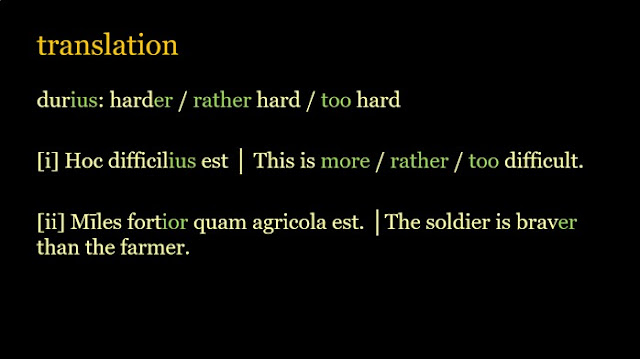Posteā multōs diēs erant tempestātēs, quae Rōmānōs in
castrīs continēbant et hostēs ā pugnā prohibēbant. Interim Britannī nūntiōs ad
partēs multās mīsērunt et auxilium rogāvērunt. Magna multitūdō equitum et
peditum ad castra Britannōrum venit. Inde Caesar, quia habēbat trecentōs
equitēs, quōs Commius Atrebās trānsportāverat ex Galliā, legiōnēs suās prō
castrīs īnstituit. Britannī, quī impetum mīlitum Rōmānōrum sustinēre nōn
poterant, terga vertērunt. Inde Caesar, postquam agrōs hostium vastāvit et
aedificia multa incendit, cōpiās ad castra dūxit.
Atrebās, Atrebātis [3/m]: Atrabatian, a member of the Atrebātēs,
a Celtic tribe
https://en.wikipedia.org/wiki/Atrebates
īnstituō, -ere, -uī [3]: set up;
arrange
Questions
Six of the following statements
are correct:
- A storm prevented the Romans from
fighting.
- Atrebas had brought cavalry from
Gaul.
- Caesar had 300 horses.
- Caesar led the troops to the camp
and destroyed the fields.
- Caesar’s troops burned a
building.
- Cavalry and infantry came to the
aid of the Britons.
- Legions were inside the camp.
- Messengers were sent to the
Britons.
- The Britons asked for help.
- The Britons could not withstand
the Romans’ attack.
- The enemy prevented the Romans
from leaving the camp.
- The enemy’s fields were
destroyed.
- The Romans could not fight
because of storms.
- The Romans could not withstand
the Britons’ attack.
Military vocabulary: verbs
If you’re reading a report in a
newspaper about, for example, a crime, the same vocabulary and phrases will come up again and
again. The same applies to the many accounts of battles in Latin; vocabulary
related to the nouns concerning warfare have already been given in five
previous posts:
https://adckl.blogspot.com/2024/08/180924-level-1-military-vocabulary-1.html
https://adckl.blogspot.com/2024/08/180924-level-1-military-vocabulary-2.html
https://adckl.blogspot.com/2024/09/180924-level-1-military-vocabulary-3.html
https://adckl.blogspot.com/2024/09/180924-level-1-military-vocabulary-4.html
https://adckl.blogspot.com/2024/09/180924-level-1-military-vocabulary-5.html
Here we can begin to list verbs
and phrases that are very common in this type of writing:
(1) dūcō, -ere, dūxī [3]: lead; redūcō:
lead back
(2) incendō, -ere, incendī [3]:
set (something) on fire; burn
(3) ([i] nuntiōs [ii] lēgātōs)
mittō, -ere, mīsī [3]: send ([i] messengers [ii] envoys (ambassadors), people
to negotiate)
(4) prohibeō, -ēre, -uī [2]: hold
back; prevent; keep (somebody) away from something; tempestatēs … hostēs ā
pugnā prohibēbant │ Storms … prevented the enemy from fighting (kept them away
from the fight)
(5) (auxilium) rogō, -āre, -āvī
[1] ask for (help); English needs ‘for’ whereas the Latin verb is followed by
an accusative
(6) (impetum) sustineō, -ēre, -uī
[2]: withstand (an attack)
(7) ([i] cōpiās [ii] equitēs
[iii] peditēs) trānsportō, -āre, -āvī [1]: transport ([i] troops [ii] cavalry
[iii] infantry)
(8) vastō, -āre, -āvī [1]: lay
waste; agrōs vastāvit: he laid waste the fields, which sounds rather odd in
English but really means he flattened the place!
(9) vertō, -ere, vertī [3]: turn
(away); tergum, -ī [2/n]: back; tergum or terga vertērunt: they turned their
backs i.e. retreated; were on the run
____________________
Afterwards there were storms for many days, which kept the Romans in their
camp and prevented the enemy from fighting. Meanwhile the Britons sent
messengers to many parts / everywhere and asked for help. A great multitude / a
huge number of cavalry and infantry came to the camp of the Britons. Then
Caesar, because he had three hundred horsemen, whom Commius, an Atrebatian had transported from Gaul, set
up his legions before the camp. The Britons, who could not withstand the
onslaught of the Romans, turned tail. Then Caesar, after he had laid waste the
fields of the enemy and set fire to many buildings, led the troops to the camp.




